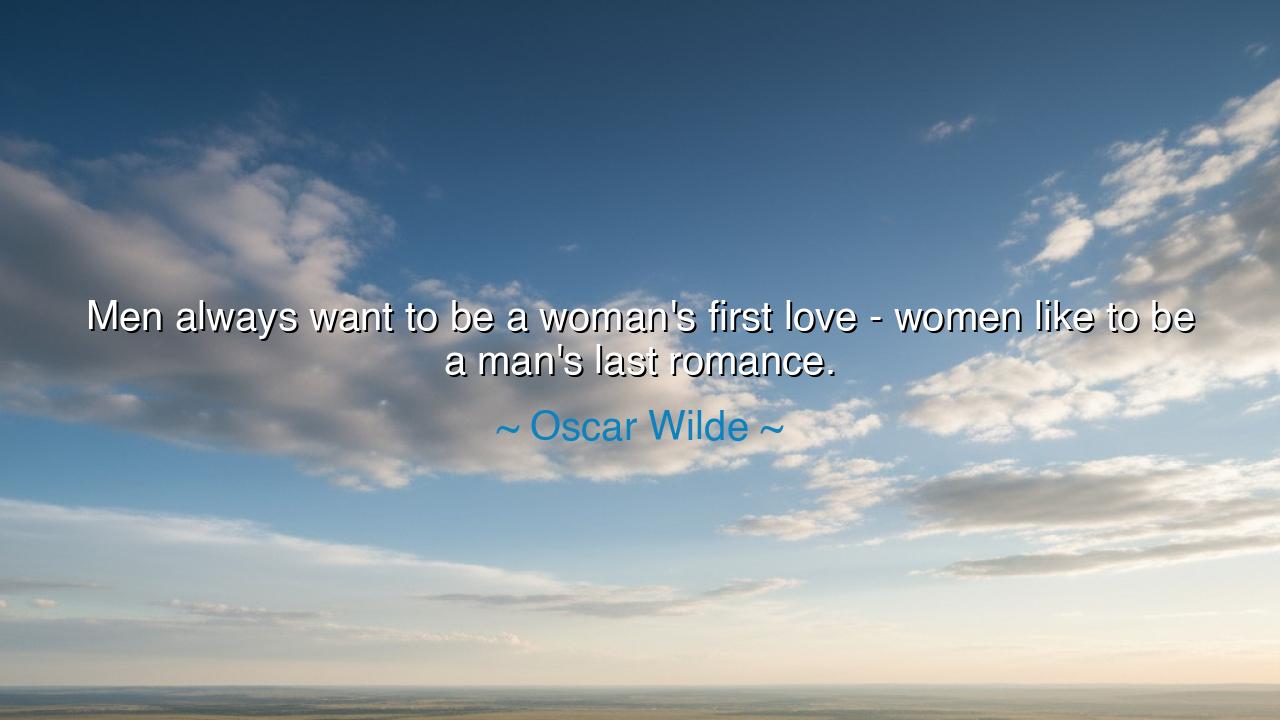
Men always want to be a woman's first love - women like to be a






“Men always want to be a woman’s first love — women like to be a man’s last romance.” Thus spoke Oscar Wilde, the poet of paradox and the prophet of human desire. In these few, glittering words, Wilde unveils not merely a jest, but a deep meditation on the nature of love — how it is colored by longing, pride, memory, and the differing dreams of men and women. His phrase is wrapped in wit, yet within it lies a mirror reflecting the heart’s most ancient truths: that men seek to conquer beginnings, while women long to complete endings; that one desires to be first in passion, and the other, final in devotion.
Wilde, who wrote amid the twilight of the Victorian world — a society obsessed with appearances, purity, and social masks — understood better than most the secret contradictions of the human soul. Beneath the manners of his age burned the eternal tension between the masculine and the feminine, between the urge to possess and the need to be cherished. His observation reveals this delicate dance: a man, drawn by pride and impulse, dreams of being the one who awakens love in a woman’s heart — her “first.” But a woman, wiser perhaps in the mysteries of endurance, seeks not the first spark but the final flame — to be the one with whom love rests, after all the searching and storming is done.
To be a first love is to be the pioneer of someone’s emotion, the one who teaches them what it means to feel, to hope, to dream. This desire springs from the male longing for creation — to carve one’s mark into the untouched, to be remembered as the one who began the story. Yet beginnings are fleeting. The first love is often wild and inexperienced, as tender as it is transient. Men, Wilde suggests, are enchanted by that very transience — they want to be remembered not necessarily for endurance, but for the thrill of being the first heartbeat in another’s awakening.
Women, on the other hand, have long carried the burden and beauty of continuity. Their desire to be a man’s last romance comes from a deeper yearning — not to be merely adored, but to be chosen. The last romance signifies not conquest, but completion; not youth, but permanence. To be loved last is to be the final resting place of the heart’s wandering, the home built after many journeys. It is to be the peace that follows the storm of passion, the tenderness that endures after the fever fades. In this way, Wilde’s wit hides a truth both tragic and noble: that the feminine soul seeks not the flash of passion, but the security of love fulfilled.
Consider the story of Napoleon and Josephine. When they met, she was older, experienced, worldly — and he, full of the fire of ambition. To him, she was not his first love, nor he her first admirer. But she became his obsession, his “last romance,” the one who haunted his heart even in exile. After his empire crumbled and his crown was lost, it was her name he whispered. She represented the end of his journey — not the glory of conquest, but the sorrow of attachment that would not die. And in her, too, one sees the opposite: she had been loved before, yet in Napoleon’s love she found something eternal. Theirs was a passion that proved Wilde’s wisdom — that first loves ignite the heart, but last loves define it.
Wilde’s insight also speaks to a greater spiritual truth: that love matures through the stages of life, moving from desire to devotion, from excitement to understanding. The young seek novelty; the wise seek depth. The first love is often blind, but the last love sees with clarity. To crave being someone’s first is to seek immortality in memory; to wish to be their last is to seek eternity in companionship. Both desires are human, both beautiful, and both incomplete without the other — for love, to be whole, must carry both the innocence of beginnings and the reverence of endings.
So, O seekers of love and wisdom, learn from Wilde’s paradox. Do not scorn the first love, nor idolize the last — for love is not measured by time, but by truth. Yet let this truth guide you: strive to love in such a way that, whether you are first or last, your love transforms the one you touch. Love not to possess, but to complete. Be someone’s safe harbor, not their battlefield.
For in the end, as Wilde’s words remind us, love’s greatest triumph is not in being the first to awaken the heart, but the last to hold it gently — when youth has passed, and only the soul remains. Then, and only then, can one say, “I have loved, and been loved — not in beginning alone, but in forever.”






AAdministratorAdministrator
Welcome, honored guests. Please leave a comment, we will respond soon